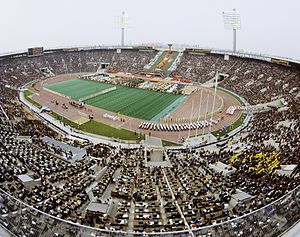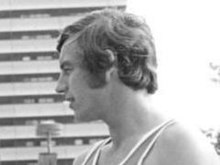1980 Summer Olympics / Athletics - 20 km walk (men)
|
|
|||||||||

|
|||||||||
| sport | athletics | ||||||||
| discipline | 20 km walk | ||||||||
| gender | Men | ||||||||
| Attendees | 34 athletes from 20 countries | ||||||||
| Competition location |
Luschniki Olympic Stadium (start and finish) |
||||||||
| Competition phase | July 24, 1980 | ||||||||
|
|||||||||
The men's 20 km at the 1980 Olympic Games in Moscow was held on July 24, 1980. The start and finish was the Luzhniki Olympic Stadium . 34 athletes took part, 25 of whom made it to the finish.
Olympic champion was the Italian Maurizio Damilano . He won ahead of Pjotr Potschintschuk from the Soviet Union and Roland Wieser from the GDR.
In addition to the medalist Wieser, Karl-Heinz Stadtmüller and Werner Heyer also competed for the GDR . Stadtmüller finished the race in eighth place, Heyer was disqualified.
The Austrian Martin Toporek was 21, his teammate Johann Siegele 22nd Johann's brother Wilfried Siegele had to abandon the race.
Walkers from Switzerland and Liechtenstein did not take part. Athletes from the Federal Republic of Germany were also not there because of the Olympic boycott.
Existing records
| World record | 1:19:35 h |
Domingo Colin ( Mexico )
|
Cherkassy , Soviet Union (now Ukraine ) | April 27, 1980 |
| Olympic record | 1: 24: 40.6 h |
Daniel Bautista ( Mexico )
|
20km walk from Montreal , Canada | July 23, 1976 |
Note: World records are not set in street walking because of the different track conditions.
Race course
Date: July 24, 1980, local time ( UTC + 3 )
There were quite a number of walkers who were trusted with a medal or an Olympic victory. Two Mexicans had improved their world record in the Olympic year: In March, Daniel Bautista, Olympic champion from 1976 , walked exactly 1:21:00 minutes, in April Domingo Colín was the first to walk the 20-minute mark with 1:19:35 minutes undercut this distance. Other favorites came from the USSR, these were: Pjotr Potschintschuk, Vice European Champion 1978 , and Anatolij Solomin, European Championship third in 1978 and temporarily holder of the world record in the same year. Roland Wieser from the GDR, European champion 1978, and the Finn Reima Salonen, temporarily holder of the world record in 1979, were also among the medal contenders.
In humid and humid conditions, a larger leading group soon formed, which was reduced to four athletes for half of the course. At the very front, it was mainly Bautista who put pressure on him, with Italians Maurizio Damilano, Solomin and Colin on his heels. After about twelve kilometers Colin had to demolish, so that there were now three walkers in front. In addition, Bautista in particular set the pace so fast that Damilano could no longer follow suit. Bautista and Solomin were alone at the top. But the competition was not yet decided: two kilometers from the finish, Bautista was disqualified for not following the walking rules, and a few hundred meters further, Solomin was disqualified. In the meantime, Colin had also been taken out of the race for poor walking. Now the way was clear for Maurizio Damilano, who became Olympic champion with a lead of more than a minute on Pyotr Potschintschuk. With this, Damilano made his international breakthrough, and later he achieved many more successes. European champion Roland Wieser won the bronze medal just over a minute back, ahead of Yevgeny Jewsjukow, USSR, and the Spaniard José Marín.
Maurizio Damilano was the first Italian Olympic champion in the 20 km walk .
Bottom line
Video
- ATLETICA MOSCA 1980 DAMILANO ORO 20 KM MARCIA , published February 18, 2015 on youtube.com, accessed December 30, 2017
Web links
- SportsReference 20km Walk , accessed December 30, 2017
- Moscow 1980 Official Report, Volume III, Results , p. 50f, English / French (PDF, 28 MB), accessed on December 30, 2017
Individual evidence
- ↑ IAAF Statistics Handbook, Berlin 2009 Page 566 (Engl.) ( Memento of 29 June 2011 at the Internet Archive ), accessed on 30 December 2017
- ↑ Moscow 1980 Official Report, Volume III, Results , p. 17 (schedule) / p. 51 (result), English / French (PDF, 28 MB), accessed on December 30, 2017
- ↑ SportsReference , accessed December 30, 2017
